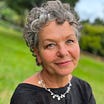Lean Closer, Open Wider, Honor the Music of Everything!
Writers in Conversation with Elizabeth Rosner, Part 2
Keep reading with a 7-day free trial
Subscribe to Aimee Liu's MFA Lore to keep reading this post and get 7 days of free access to the full post archives.







